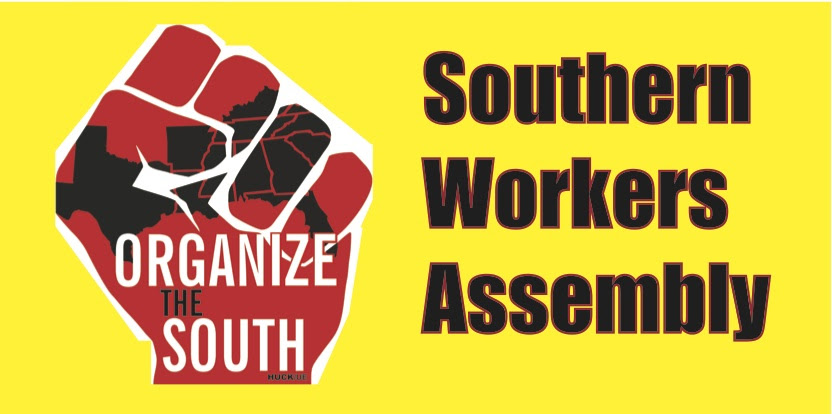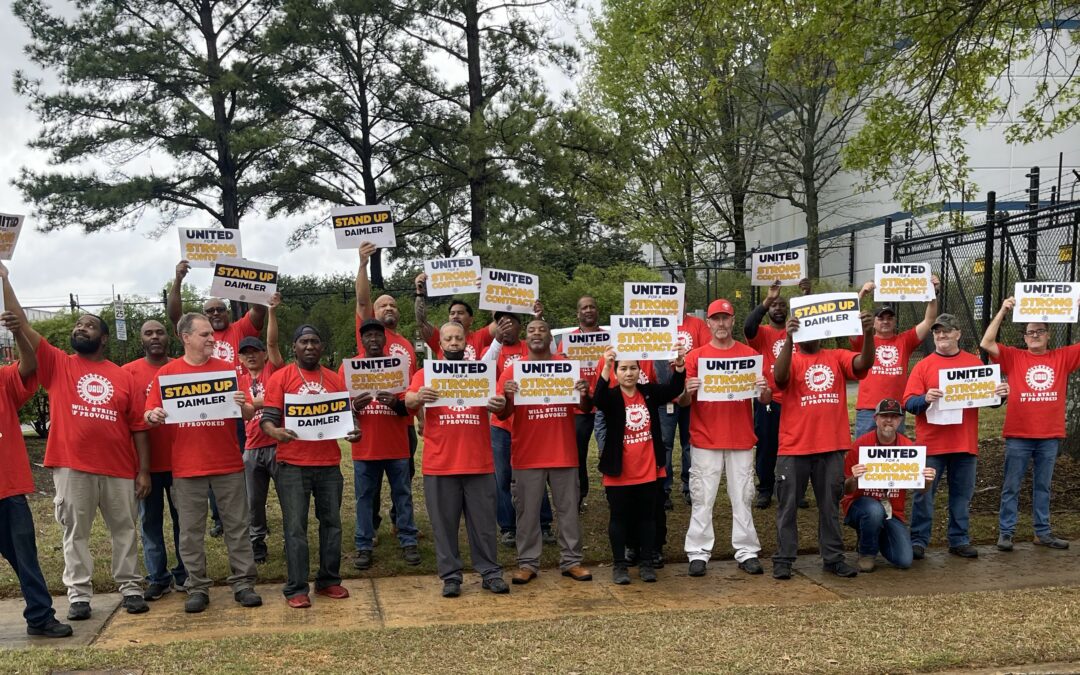The Southern Workers Assembly expresses our full solidarity with the 7,000 Daimler Truck North America (DTNA) workers and UAW members in North Carolina, Tennessee, and Georgia engaged in a contract fight to win record gains from this highly profitable, multinational company.
The workers’ current UAW master contract with the company expires at midnight on April 26, and the UAW has made it clear that if a new contract that meets workers’ demands is not settled by then, workers will hit the picket line and go on strike. Notably, in March, UAW workers at DTNA voted by a margin of 96 percent to authorize a strike if necessary, and workers in the plants are fired up and ready to do what it takes to win justice. UAW workers at DTNA make Freightliner and Western Star heavy trucks and school buses for Thomas Built Buses.
The contract fight by DTNA workers – organized under the slogan “Record profits mean record contracts” – follows the historic “Stand Up” strike last fall by auto workers at plants across by the country owned by the Big Three auto manufacturers (Ford, GM, and Stellantis) that secured a resounding victory for workers.
Daimler Truck, the parent company of DTNA, is the largest commercial vehicle manufacturer in the world. Since 2018, Daimler has seen an incredible 90 percent increase in their profits. In 2023 alone, Daimler Truck’s profits increased by 39 percent, raking in nearly $6 billion in profits. In March, CEO Martin Daum referred to company profits as “red hot” and had the audacity to assert that “leftover money certainly belongs” to Daimler Truck shareholders. The company plans to increase stock dividends by 46 percent.
In that same period of time, the cost of basic living expenses – groceries, gas, childcare, housing, healthcare – has gone through the roof, in some cases increasing by upwards of 20 percent. Despite working for a highly profitable company, many DTNA workers have been forced to find a second job to make ends meet. Workers are demanding big wage increases, cost of living adjustments, job security protections, improved retirement benefits, an equalization of pay scales across all of DTNA’s plants, and more at the bargaining table.
The outcome of the struggle at DTNA will have ramifications far beyond the company. This fight comes as auto workers across the South are initiating an unprecedented, coordinated organizing drive at the 13 nonunion auto manufacturers in the region. Workers at the Volkswagen plant in Chattanooga, Tennessee are set to vote to join the UAW on April 17-19 – just one week before the expiration of the UAW master contract at DTNA. Workers at Mercedes-Benz in Vance, Alabama have also recently filed for an election to join the UAW after reaching supermajority support in the plant, and organizing drives are going public at other auto plants across the region.
A particularly notable aspect of the struggle at DTNA is the UAW’s efforts to build solidarity with DTNA workers in Mexico and Brazil, as a direct challenge to a key strategy by capital to pit workers against one another on the basis of nationality, and use the threat of moving jobs to Mexico in particular to beat back efforts by workers to raise conditions. As noted in an op-ed published in Labor Notes by Brandon Mancilla, UAW Region 9A Director, the UAW is now fully dedicated to the task of building solidarity with our Mexican brothers and sisters in auto, heavy truck manufacturing, and other sectors.
“Right now the ruling class is using people’s anxieties over border security to stoke division,” Mancilla writes. “When we turn a blind eye to it, we enable the Donald Trumps of the world to continue deceiving workers. Capital can move freely across borders, but workers are criminalized. The best resistance to Donald Trump is to unite our working-class struggles…The UAW, and the labor movement as a whole, face an existential question: are we going to consent to our decline, or do what it takes to end the international race to the bottom?”
Facilitated by billions in government subsidies, the auto industry as a whole is poised to transition production increasingly into battery and electric vehicle (EV) production in the years ahead. Much of those operations will be located in the U.S. South, with nearly two-thirds of jobs in the sector coming to the region, and especially Georgia, North Carolina, and South Carolina. Billions of dollars in capital investments in other parts of the manufacturing sector are also flowing into the South. The United States is now the cheapest country in the world to produce electric vehicles, and these companies have chosen the region to take advantage of the anti-labor, racist political environment that for centuries has led to workers in the region experiencing the highest levels of poverty, the lowest life expectancies, the worst health outcomes, political disenfranchisement, polluted communities, to name a few of the devastating impacts.
Workers across sectors – including public schools workers, municipal employees, service-sector workers, industrial workers, and more – are taking action and demonstrating determination to change the future of the region. A decisive victory by DTNA workers, alongside the wave of auto organizing spreading throughout the region, will be critical for turning the tide and building working class organization and power in the South.
Solidarity with UAW workers at DTNA!
Organize the South!



